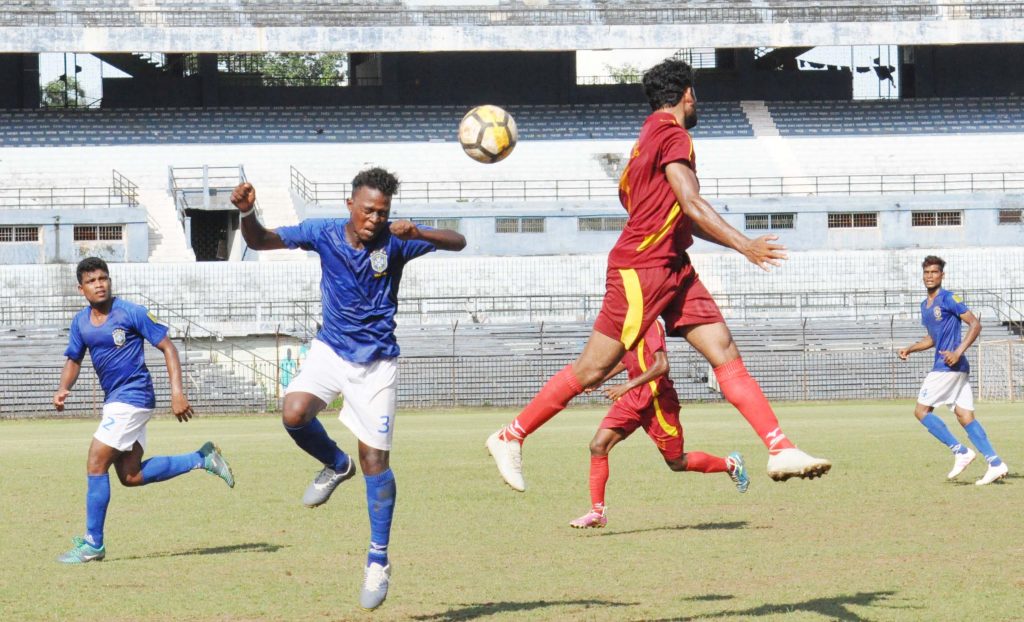Bhubaneswar: On paper, Odisha’s landmark Kalinga Stadium is set to host FIFA U-17 Women’s World Cup next year as one of the venues and the City being touted as the ‘sports capital of India.’ But off it, it cuts a sorry figure as far as staging local sports is concerned.
The Football Association of Odisha (FAO) League (Division-1) is a case in point where a State Bank of India (SBI) footballer Ajay Kumar Nayak died on the pitch last Saturday in the absence of proper medical facilities at the Barabati Stadium in Cuttack, the venue of the league match.
When FIFA and AIFF rules clearly state the mandatory attendance of a doctor and other amenities at the venue, FAO seems to have flouted all to invite the catastrophe which shook the clubs and players alike.
Trashing all allegations, FAO administration has blamed Nayak’s diabetes as the reason for death, but there are other sides of the story emerging from the football fraternity itself to actually show the administration in poor light.
Former India national team midfielder Rajendra Prasad Singh has blamed the FAO for the lack of on-field amenities which caused one of his teammates, Nayak’s untimely demise September 7.
Singh, an SBI employee was playing alongside Nayak, when the 33-year-old collapsed on the ground against SAI-STC Cuttack in the 27th minute. After remaining unconscious for quite a few minutes, Nayak was taken to nearby SCB Medical College and Hospital where the doctors declared him ‘brought dead’. Massive cardiac arrest was found to be the reason for death.
“There was no ambulance in the ground, not even a proper medical team. When Nayak fell on the ground first time, we thought it was due to fits (a seizure caused by something interrupting the electrical activity in the brain),” Singh told Orissa POST over the phone.
“Even when Nayak was lying on the ground unconscious the doctor was still sitting outside. It was after repeated insistence he finally showed up. But he could do nothing and how can he? I doubt he is a doctor. Nayak was then stretchered out of the ground and then we took him in our car to the hospital, but it was too late.”
Echoing Singh’s allegation, an official from Sunrise Club revealed that a compounder (assistant at the doctor’s clinic) from some local hospital acts as a doctor for all the matches. “The person is not at all a qualified doctor but a compounder. Even no ambulance remains present during the matches,” the official said on condition of anonymity.
Asked whether SBI would lodge a complaint against the match officials, Singh said, “We the players haven’t sat together yet. But in a couple of days, we will sit together and discuss our next step because to secure the safety of players in the future.”
Singh also launched a scathing attack on the FAO administration for making over aged players take part, which is against the rule.
“When SBI became champions in 2008, some of the clubs and the state association sat together and decided that bona fide players will be playing in the league which is against the rule,” said Singh who played five years (1997-2002) for Kolkata giants for Mohun Bagan.
“In the All India Football Federation (AIFF) no corporate organisation gets affiliation to play in a league. Instead, recreation clubs of the public sector units get affiliation where you can bring in players from other states. But here they made the ruling that 5-6 bona fide players should be there in the playing XI.
“As a result players of around 50 years of age are made to play in order to save the organisation. We told them that we don’t want to play at this age but our words fell on deaf ears,” added Singh who represented India in 2002 FIFA World Cup qualifiers.
However, FAO administrator Subhasish Behera denied all allegations stating everything was in place during the game. “No no…there was an ambulance and all the proper amenities at the ground that day. Ajay Kumar Nayak had diabetes and he was suffering from hypertension which we got to know later,” Behera said in confident note.
Indian football’s governing body AIFF though doesn’t have a stake in the state leagues but spelt out the dos and donts of the official matches. When this newspaper contacted AIFF senior vice-president Subrata Dutta, he said, “A referee cannot start a match if all the necessities — medical team, ambulance, are not there in place before a match. There are some league rules and regulations that need to be followed. Without that, the referee should not start the match.”
Dutta also added that since all the state associations are autonomous bodies, AIFF is in no position to take any action against FAO. With blame game on, it remains to be seen whether Nayak gets justice or this sorry state of affairs prevail.
